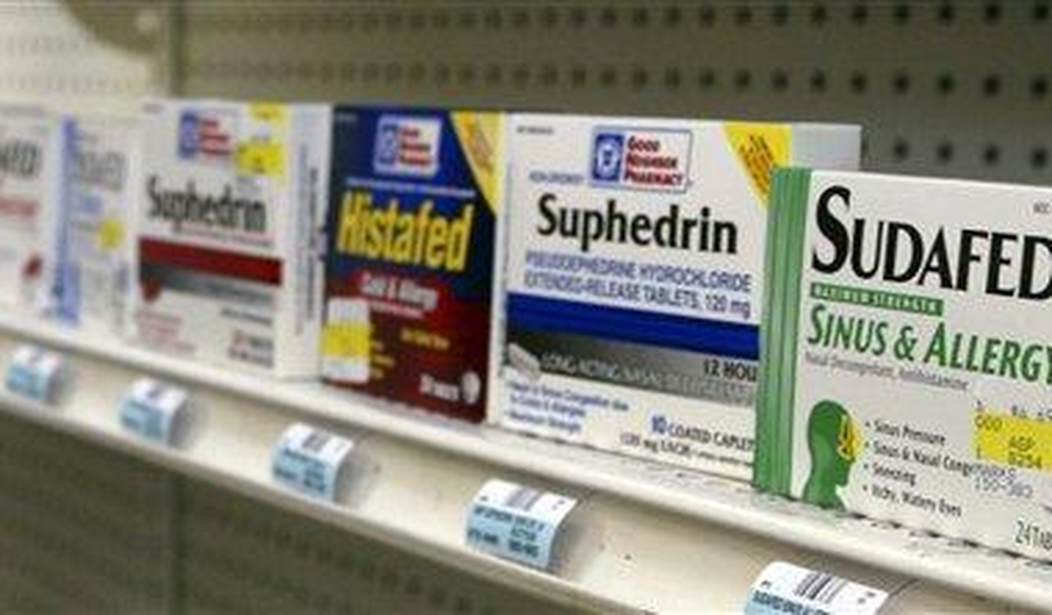I know that drug companies are pretty standard villains on the left. After reading this story I may be joining them.
Today an FDA advisory panel decided that a common ingredient in over-the-counter cold remedies was ineffective. It’s called phenylephrine and it’s included in hundreds of products under various names. These products are a gold mine for drug companies like GlaxoSmithKline:
Every cold and flu season, millions of Americans reach for these products, some over decades. The decongestant is in at least 250 products that were worth nearly $1.8 billion in sales last year, according to an agency presentation. Among the products: Sudafed Sinus Congestion, Tylenol Cold & Flu Severe, NyQuil Severe Cold & Flu, Theraflu Severe Cold Relief, Mucinex Sinus Max and others.
But the reason this panel voted it didn’t work is that we’ve had scientific evidence going back several decades that phenylephrine is useless at drying up congestion, at least when it’s consumed orally.
“If you have a stuffy nose and you take this medicine, you will still have a stuffy nose,” said Dr. Leslie Hendeles, a pharmacist from the University of Florida in Gainesville who, along with colleagues, first petitioned the F.D.A. in 2007 to remove the drug from the market…
Now an emeritus professor, Dr. Hendeles said in an interview on Tuesday that he had been evaluating the ingredient since 1993.
“The bottom line is quality research has told the true story about phenylephrine,” he said.
For consumers, the potential benefits of ending use of the ingredient, the agency suggested, would include avoiding unnecessary costs or delays in care by “taking a drug that has no benefit.”
So it has been pretty clear for 15 or more years that this ingredient does not work but they just keep selling it to us. If you’ve ever gotten a bad cold that made it hard to breath through your nose and your OTC medicine didn’t seem to help, now you know why. Despite this, the Consumer Healthcare Products Association which represents the drug makers has argued that removing this ineffective ingredient would somehow place a burden on consumers and the health care system.
There is an alternative drug which is very effective at drying up a runny nose. That drug is called pseudoephedrine but, unfortunately, that’s the drug that was widely used by illegal drug makers to create methamphetamine. So back in 2006 controls were placed on the purchase of OTC drugs containing pseudoephedrine and in some cases phenylephrine was added as a replacement:
Pseudoephedrine can be used to manufacture meth, and during the early years of the meth epidemic in the 1990s and early 2000s, its easy availability helped small-scale dealers cook and sell the drug from their homes. In Missouri alone, there were almost 3,000 meth lab busts in 2004.
In response, Congress passed the Combat Methamphetamine Epidemic Act of 2005, part of the Patriot Act, which, among other things, made pseudoephedrine much harder to purchase. Under the law, starting in 2006, packages of the drug must be kept behind the counter or in locked cases, purchasers have to present identification and there are limits to how many tablets can be bought (the limits vary state-to-state).
Drug companies—led by Sudafed’s maker, Johnson & Johnson—adjusted by switching ingredients. The company now sells a new formulation, called Sudafed PE, which is made with phenylephrine, a chemical which can’t be used to make meth, as well as some medications that still use pseudoephedrine.
So instead of something that worked, we got sold something that didn’t.
Nearly two years ago the Atlantic published a story about the new breed of meth that was being produced in Mexico. The gist of the article was that cartels had shifted to industrial scale production of in giant labs. The product was so pure it had a much greater impact on users, often making them turn violent and paranoid. The director of a drug-treatment center in Missouri told the Atlantic, “I don’t know that I would even call it meth anymore.” It was causing permanent mental problems in people as young as 30-years-old.
So it’s possible that the small-scale drug makers in the US can’t compete with the price or purity of what’s out there anymore. There may be no reason to worry about them trying to buy up all the cold medicine.
Getting back to the drug companies, they’ve been selling us a product which really doesn’t do what it claims to do for decades. The only people who could possibly be happy about that are the folks at Kimberly-Clark Corporation, the makers of Kleenex.








Join the conversation as a VIP Member